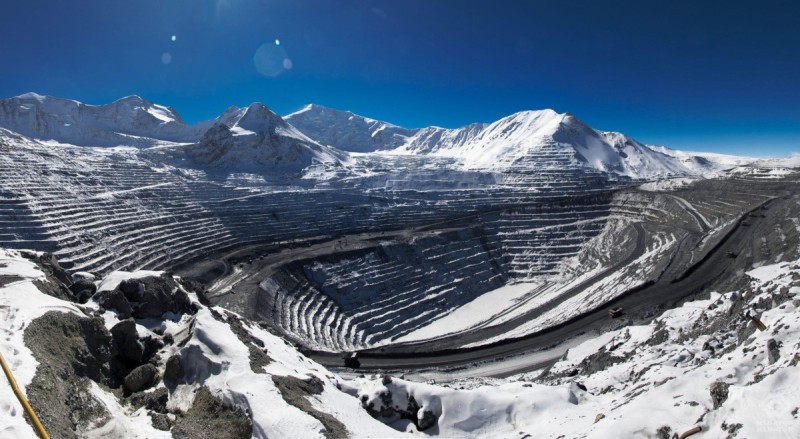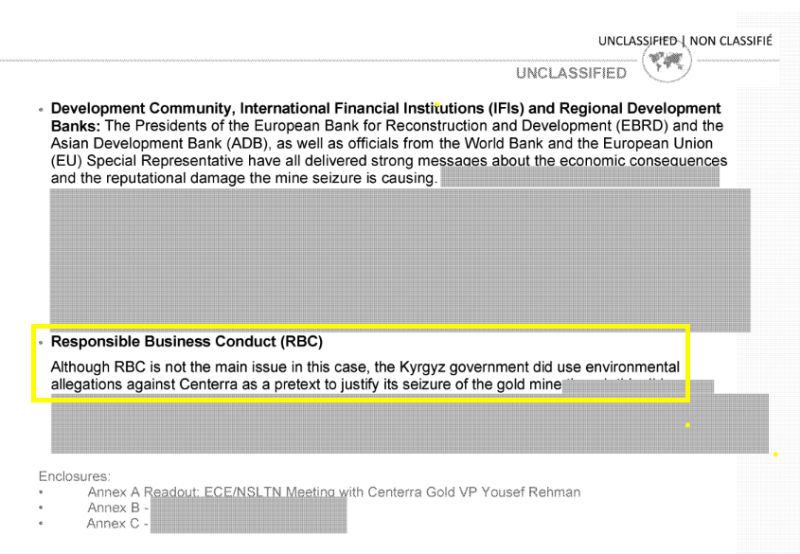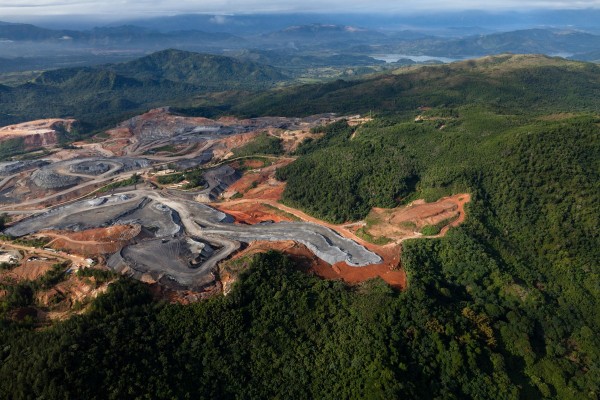Canada dismissed Kyrgyzstan’s environmental concerns as ‘pretext’ in mine dispute, documents reveal
Internal files show Ottawa cast Kyrgyzstan’s environmental warnings as a cover for seizing a Canadian-run gold mine

The Kumtor mine is one of the largest gold mines in Central Asia. Photo courtesy the Kumtor Gold Company.
When Kyrgyzstan nationalized the Kumtor gold mine in 2021, citing environmental devastation and tax evasion by its Toronto-based operator, Centerra Gold, Canadian officials quickly mobilized to protect corporate interests. Newly released documents, acquired by Canadian Dimension through an access to information request, show that rather than taking Kyrgyzstan’s ecological concerns seriously, Ottawa cast them as a “pretext” for expropriation and focused instead on defending Canadian mining rights and preserving foreign investor confidence.
Although heavily redacted, the documents reveal how the Canadian government coordinated with Centerra and international financial institutions in the aftermath of the takeover. Publicly, ministers warned of damage to Kyrgyzstan’s investment climate. Privately, officials framed the nationalization as a threat to Canadian capital abroad, while expressing little concern about the mine’s documented environmental harms, including glacial waste dumping that had already resulted in a multi-billion-dollar court ruling against Centerra in Kyrgyzstan.
Canada’s internal communications—ranging from diplomatic meetings and briefing notes to embassy visits and “key message” documents—focused overwhelmingly on protecting Centerra’s assets and reputation. The potential poisoning of a transboundary water system was met with indifference; officials were far more alarmed about the message the nationalization might send to other countries considering similar moves against Canadian firms.
This response is emblematic of Canada’s broader role in global mining, where the state routinely acts to shield extractive corporations from accountability. With roughly 60 percent of the world’s mining companies headquartered in Canada, the federal government has long operated as an enabler of corporate power abroad, often at the expense of environmental stewardship and democratic decision-making in the Global South.
Kyrgyzstan’s Kumtor mine, located in the glacial highlands of the Tian Shan mountains, has long been a linchpin of the national economy. In 2019, the mine contributed nearly 45 percent of Kyrgyzstan’s industrial output. Before nationalization, Centerra Gold stood as the country’s largest private employer and its biggest foreign investor. But those statistics masked deep discontent.
For years, the mine had been the subject of environmental and economic controversy. In 1998, a truck transporting sodium cyanide (used in gold extraction) crashed near the village of Barskoon, spilling 1.7 tons of the toxic chemical into a river. The incident sparked protests that never fully dissipated. Over the next two decades, similar incidents and allegations of tax avoidance continued to spark public outrage, battering Centerra’s reputation in the region.
While the Kyrgyz state originally held a 60 percent stake in Kumtor, its share had dwindled to just 26 percent by early 2021. Meanwhile, calls for nationalization gained momentum. Sadyr Japarov, an early critic of Centerra’s presence, emerged as a key political figure after leading protests in 2012 and presenting a parliamentary case for reclaiming the mine. His election to the presidency in 2020 set the stage for swift action.
On May 6, 2021, Kyrgyzstan’s parliament passed legislation allowing the state to temporarily manage Kumtor. Days later, authorities raided the company’s offices in Bishkek. By mid-May, the mine was under full state control, and the Kyrgyz government demanded $10 billion from Centerra in unpaid taxes and environmental damages.
In response, Centerra CEO Scott Perry declared the move “hostile” and vowed to protect shareholders “through all legal means.” The Canadian government quickly rallied behind him. Foreign Affairs Minister Marc Garneau and International Trade Minister Mary Ng issued a joint statement condemning the nationalization, warning that it would have “far-reaching consequences” for foreign investment in Kyrgyzstan.
Absent from the statement was any acknowledgment of the court ruling that triggered the takeover. Earlier that month, a Kyrgyz court found Centerra guilty of illegally dumping waste on glaciers, causing $3 billion in environmental damage. Environmental experts warned that the company’s operations threatened not only Kyrgyzstan’s water supply but also the vast transboundary Syr Daria river system, which runs through multiple Central Asian countries.
Yet internal Canadian communications expressed far more concern for Centerra’s bottom line than Central Asia’s ecological future. In June 2021, Marc Garneau raised the issue with Kyrgyz Foreign Minister Ruslan Kazakbayev. That same month, Centerra secured a ruling from Ontario’s Superior Court barring the Kyrgyz-appointed mine manager from overseeing operations.
An excerpt from a Global Affairs Canada document, acquired through an access to information request, states that the Kyrgyz government used environmental allegations as a “pretext” to justify its seizure of the Kumtor gold mine.
An excerpt from a Global Affairs Canada document, acquired through an access to information request, states that the Kyrgyz government used environmental allegations as a “pretext” to justify its seizure of the Kumtor gold mine.
From this point on, internal emails between Centerra and the Canadian government intensified. Though largely redacted, they document ongoing strategy sessions, diplomatic overtures, and trade ministry debriefings. One five-paragraph memo includes only a single visible sentence: “DMT [Deputy Minister of International Trade] had a call with Vice-President and General Counsel of Toronto-based Centerra Gold.”
Another two-and-a-half-page email is fully blacked out, aside from a reference to a debrief in Geneva between Centerra and Kyrgyz officials, held at the request of Canadian foreign affairs personnel. While the contents of these conversations remain hidden, they reveal a clear alignment of interests and coordination between the Canadian state and Centerra leadership.
Further insight comes from Global Affairs Canada’s “proposed key messages” on Kumtor, which outline the pressure tactics used to discredit Kyrgyzstan’s actions. These messages assert that the seizure of Centerra’s assets “negatively impacted Kyrgyzstan’s international reputation” and would undermine the country’s ability to attract foreign direct investment and international aid.
Between September 20 and 24, Canadian embassy officials, including Trade Commissioner Nathan Lysons, visited Kyrgyzstan’s capital Bishkek. Yet no meetings were scheduled with Kyrgyz government representatives. Instead, officials met exclusively with diplomatic and business actors, sidestepping engagement with the very authorities at the center of the dispute.
Centerra and the Canadian government remained in close contact. A December 20, 2021 briefing note prepared for the deputy minister of international trade confirms that Canada was “closely monitoring continued developments with regard to Kumtor” and remained in communication with both Centerra executives and international financial institutions, such as the European Bank for Reconstruction and Development.
The same document outlines Ottawa’s priorities in Kyrgyzstan: “to secure existing commercial relations” and to promote reform via the Canada Fund for Local Initiatives. Absent were references to poverty reduction, environmental justice, or infrastructure support. The government’s overriding concern was the protection of Canadian corporate assets.
Despite sustained diplomatic pressure, Centerra eventually conceded. In 2022, the company formally handed over ownership of Kumtor to the Kyrgyz state. The mine remains under public control.
The documents confirm what observers of Canada’s extractive sector have long suspected: when Canadian mining companies face resistance abroad, Ottawa mobilizes to protect them—not the environment, not workers, and not the sovereignty of other nations. From the glaciers of Kyrgyzstan to Indigenous territories in South America, profit comes first.
Owen Schalk is the author of Targeting Libya: Canadian Dams, Canadian Bombs, an exploration of Canada’s pivotal yet little-known role in Libya’s history, forthcoming from Lorimer Books.










